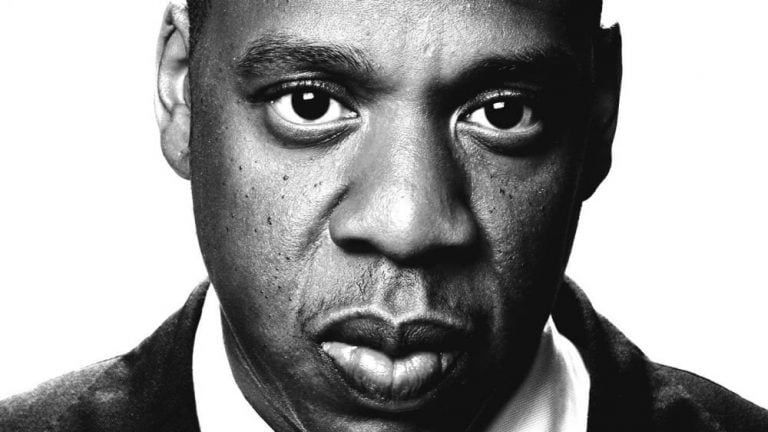Every artist makes their new record in the shadow of their last, for better and for worse. But in the case of Jay-Z’s new album 4:44, his first in four years, the point of comparison is not 2013’s underwhelming Magna Carta Holy Grail but his wife Beyoncé Knowles Carter’s Lemonade.
And though it might be a stretch to call 4:44 a companion piece to Lemonade, it is a response to it – a record that could simply not exist without the shattering, accusatory cry of Beyoncé’s masterpiece.
Perhaps it’s unsurprising, then, that 4:44 is coated in something distinctly hangdog. Jay-Z is an artist whose career has been defined by a series of sleek, self-serving pivots – he’s gone from gangster to millionaire; from Mafioso bloodletter to R&B crooner; from Kanye’s mentor to his supposed tormentor – and with 4:44 he has once again shifted the boundaries of his personhood, revealing more than he has ever revealed before. He is a man humbled; a performer ashamed, and he embraces the new identity Lemonade blessed him without hesitation.
Of course, the glinting honesty of that record left him with no choice; backed him in a corner, raised the stakes. What was he meant to do after his wife laid bare his infidelities, sweeping up the most intimate details of his personal life and magpie-ing them into a sociopolitical paean to the dispossessed? Anything less than a soul-bearing glimpse into his great shame and guilt would be considered glib; like following up a fiery sermon with a fart joke.
So, on tracks like the gospel-inflected ‘4:44’, we get unadulterated, unfettered apologies – songs so confessional and self-depreciating that they call to mind the best work of that arch pathetic piss-taker Loudon Wainwright III. “I apologise,” Jay raps on the title track, his thin, raspy voice fraying like so much thread. “I suck at love, I think I need a do-over.”
Even the more upbeat tracks come nickel-coated in despair: ‘Family Feud’ might begin with invocations to “turn the music up” but behind all the talk of liquid gold and stashes lies the creeping, indelible mark of infidelity, and the hushed, jaunty ‘Moonlight’ manages to turn the La La Land/Moonlight Oscars controversy into a trembling metaphor for loss and disappointment.
Even the more upbeat tracks come nickel-coated in despair.
Such songs are unequalled in Jay-Z’s discography. There is no precedent for the way his voice snakes around the lulling, lopsided bars on ‘Moonlight’, at once totally at ease and yet awkward, unprotected; no precedent for the way his voice rasps around the meditative boasts of ‘Legacy’. Such vocal performances are a far cry from ‘99 Problems’, of course, but more than that they’re a far cry from everything Jay has yet turned in; blistering acknowledgements of fault.
Yet despite the tender, rubbed-raw quality of its standout tracks, 4:44 is no sullen shame fest. It could have been, of course – could have been about as nuanced as a late night drunken phone call, full of sobbed apologies and bleary promises of change.
But Jay-Z is too smart for that, and his intentions are twofold: he might be bearing it all, but he’s never losing control, and he is, as always, eager to cultivate his image as a magnate with a card shark’s eye for detail. The man might have been hurt, but he still has empire to protect, and 4:44 is packed with references to his sprawling successes.
So for every moment of husky-voiced apology, there is one of bombastic, if still a little wounded pride to offset it. The excellent ‘The Story Of OJ’ is full of Jay’s usual business advice; a mission statement that emphasises capitalistic success and shrewd manipulation disguised as an old-school rap banger, and even the tender ‘Smile’, a song about his mother’s sexuality, is still pockmarked with proudly barked acknowledgements of his considerable wealth.
“We drinkin’ Cristal and… yeah,” he memorably boasts. “Kept the tray on me like Chris Paul then / Drinkin’ Ace of Spades like it’s codeine now.”
Then there’s the guest spots, turns from such innovators as Frank Ocean, Damian Marley, Jay’s mother and, of course, his wife. Expertly chosen and sparingly used, they speak to the musician’s impeccable eye when it comes to collaborators. Jay knows how to get help when he needs it, but never at the risk of drowning out his own voice – Ocean’s involvement in ‘Caught Their Eyes’, for example, only emphasises the push-pull attraction of a song that combines the sinister with the sensual.
Jay doesn’t need a posse any more: he could easily go it alone and release a record with no features if the whim him took him. But instead he uses a cherry-picked collection of innovators to play to his strengths; solidifying his identity with the help of those he has inspired, and those who inspire him.
Ultimately, 4:44 is that rare thing in pop music: a contradiction. Rather than the inert proclamations of self we might be growing used to, the album bucks from easy classification, jerking away from mere portraiture and becoming something more; something greater. This is no howling cry of despair, although at times it feels like one, and neither is it the jubilant brag of a man with the combined worth of $1.16 billion, although now and then it feels like that too.
Instead, it is a shimmering work of uneasy autobiography; the sound of an all-time great musician embracing the parts of his personhood that don’t add up, and becoming all the more assured because of them.
4:44 is out now on Tidal.


































